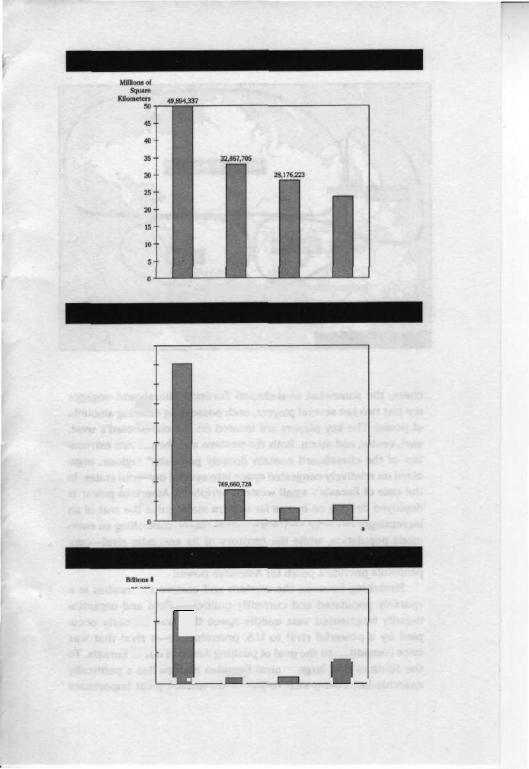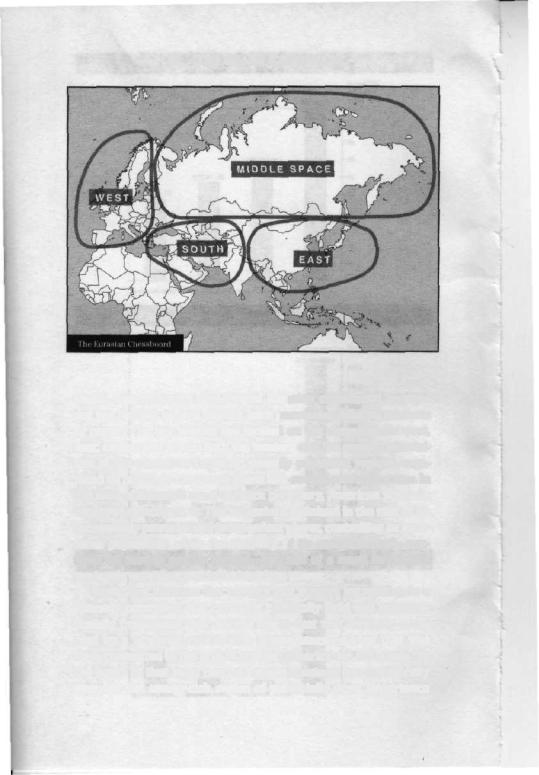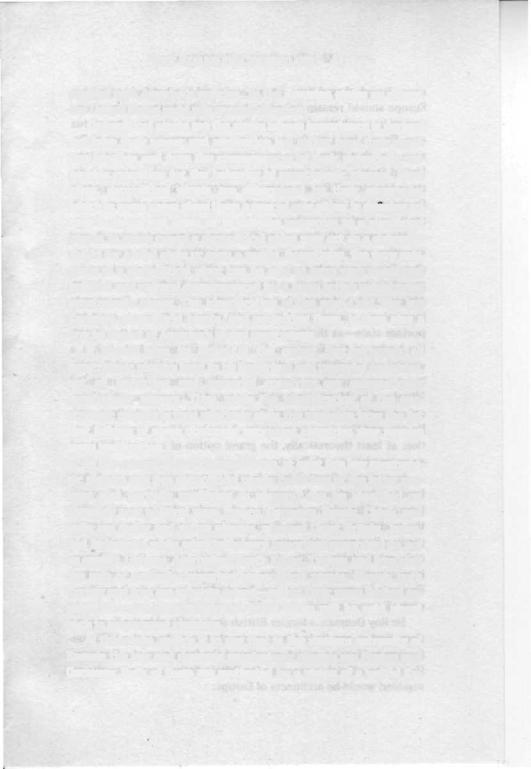
Grand_Chessboard
.pdf
Tlie Continents: Area
23.496,900
Eurasia |
Alrica/MlrJtIle East South Ainerka North America |
The Continents: Population
MUlions
4.5O0
4.053.455.374
4.000
3,500 |
|
|
|
|
|
|
|
|
|
1,000 |
|
|
|
|
|
|
|
|
|
2,500 |
|
|
|
|
|
|
|
|
|
2.000 |
|
|
|
|
|
|
|
|
|
1.500 |
|
|
|
|
|
|
|
|
|
1.000 |
|
|
|
|
|
|
|
|
|
500 |
|
|
|
|
334.916.662 |
3 S 6 ' 2 9 2 0 3 6 |
|
||
|
Eurasia |
Atrita/Mlddle Rait |
South America |
NorthAmeric |
|
||||
|
|
The Continents: GNP |
|
|
|
|
|||
JU.UUU - |
|
|
|
|
|
|
|
|
|
|
34.000 |
|
|
|
|
|
|
|
|
20,000 |
I |
1 |
|
|
|
|
|
|
|
|
|
|
|
|
|
|
|||
10.000- |
|
|
|
8.100 |
|
|
|||
|
|
|
1.5O0 |
|
1,750 |
[ |
|
1 |
|
|
|
|
|
|
|
||||
|
|
|
|
|
|
|
|
||
0 - |
[ |
- I |
1 |
1 |
|
1 |
1 |
i |
|
|
Eurasia |
Airtca/Middle Eitt |
South America |
North America |
|
||||

34 THE GRAND CHESSBOARD
chess, the somewhat oval-shaped Eurasian chessboard engages not just two but several players, each possessing differing amounts of power. The key players are located on the chessboard's west, east, center, and south. Both the western and the eastern extremities of the chessboard contain densely populated regions, organized on relatively congested space into several powerful states. In the case of Eurasia's small western periphery, American power is deployed directly on it. The far eastern mainland is the seat of an increasingly powerful and independent player, controlling an enormous population, while the territory of its energetic rival—con- fined on several nearby islands—and half of a small far-eastern peninsula provide a perch for American power.
Stretching between the western and eastern extremities is a sparsely populated and currently politically fluid and organizationally fragmented vast middle space that was formerly occupied by a powerful rival to U.S. preeminence—a rival that was once committed to the goal of pushing America out of Eurasia. To the south of that large central Eurasian plateau lies a politically anarchic but energy-rich region of potentially great importance

THE EURASIAN CHESSBOARD 35
to both the western and the eastern Eurasian states, including in the southernmost area a highly populated aspirant to regional hegemony.
This huge, oddly shaped Eurasian chessboard—extending from Lisbon to Vladivostok—provides the setting for "the game." If the middle space can be drawn increasingly into the expanding orbit of the West (where America preponderates), if the southern region is not subjected to domination by a single player, and if the East is not unified in a manner that prompts the expulsion of America from its offshore bases, America can then be said to prevail. But if the middle space rebuffs the West, becomes an assertive single entity, and either gains control over the South or forms an alliance with the major Eastern actor, then America's primacy in Eurasia shrinks dramatically. The same would be the case if the two major Eastern players were somehow to unite. Finally, any ejection of America by its Western partners from its perch on the western periphery would automatically spell the end of America's participation in the game on the Eurasian chessboard, even though that would probably also mean the eventual subordination of the western extremity to a revived player occupying the middle space.
The scope of America's global hegemony is admittedly great, but its depth is shallow, limited by both domestic and external restraints. American hegemony involves the exercise of decisive influence but, unlike the empires of the past, not of direct control. The very scale and diversity of Eurasia, as well as the power of some of its states, limits the depth of American influence and the scope of control over the course of events. That megacontinent is just too large, too populous, culturally too varied, and composed of too many historically ambitious and politically energetic states to be compliant toward even the most economically successful and politically preeminent global power. This condition places a premium on geostrategic skill, on the careful, selective, and very deliberate deployment of America's resources on the huge Eurasian chessboard.
It is also a fact that America is too democratic at home to be autocratic abroad. This limits the use of America's power, especially its capacity for military intimidation. Never before has a pop-

36 THE GRAND CHESSBOARD
ulist democracy attained international supremacy. But the pursuit of power is not a goal that commands popular passion, except in conditions of a sudden threat or challenge to the public's sense of domestic well-being. The economic self-denial (that is, defense spending) and the human sacrifice (casualties even among professional soldiers) required in the effort are uncongenial to democratic instincts. Democracy is inimical to imperial mobilization.
Moreover, most Americans by and large do not derive any special gratification from their country's new status as the sole global superpower. Political "triumphalism" connected with America's victory in the Cold War has generally tended to receive a cold reception and has been the object of some derision on the part of the more liberal-minded commentators. If anything, two rather varying views of the implications for America of its historic success in the competition with the former Soviet Union have been politically more appealing: on the one hand, there is the view that the end of the Cold War justifies a significant reduction in America's global engagement, irrespective of the consequences for America's global standing; and on the other hand, there is the perspective that the time has come for genuine international multilateralism, to which America should even yield some of its sovereignty. Both schools of thought have commanded the loyalty of committed constituencies.
Compounding the dilemmas facing the American leadership are the changes in the character of the global situation itself: the direct use of power now tends to be more constrained than was the case in the past. Nuclear weapons have dramatically reduced the utility of war as a tool of policy or even as a threat. The growing economic interdependence among nations is making the political exploitation of economic blackmail less compelling. Thus maneuver, diplomacy, coalition building, co-optation, and the very deliberate deployment of one's political assets have become the key ingredients of the successful exercise of geostrategic power on the Eurasian chessboard.

THE EURASIAN CHESSBOARD 37
GEOPOLITICS AND GEOSTRATEGY
The exercise of American global primacy must be sensitive to the fact that political geography remains a critical consideration in international affairs. Napoleon reportedly once said that to know a nation's geography was to know its foreign policy. Our understanding of the importance of political geography, however, must adapt to the new realities of power.
For most of the history of international affairs, territorial control was the focus of political conflict. Either national self-gratifica- tion over the acquisition of larger territory or the sense of national deprivation over the loss of "sacred" land has been the cause of most of the bloody wars fought since the rise of nationalism. It is no exaggeration to say that the territorial imperative has been the main impulse driving the aggressive behavior of nation-states. Empires were also built through the careful seizure and retention of vital geographic assets, such as Gibraltar or the Suez Canal or Singapore, which served as key choke points or linchpins in a system of imperial control.
The most extreme manifestation of the linkage between nationalism and territorial possession was provided by Nazi Germany and imperial Japan. The effort to build the "one-thousand-year Reich" went far beyond the goal of reuniting all German-speaking peoples under one political roof and focused also on the desire to control "the granaries" of Ukraine as well as other Slavic lands, whose populations were to provide cheap slave labor for the imperial domain. The Japanese were similarly fixated on the notion that direct territorial possession of Manchuria, and later of the important oil-pro- ducing Dutch East Indies, was essential to the fulfillment of the Japanese quest for national power and global status. In a similar vein, for centuries the definition of Russian national greatness was equated with the acquisition of territory, and even at the end of the twentieth century, the Russian insistence on retaining control over such non-Russian people as the Chechens, who live around a vital oil pipeline, has been justified by the claim that such control is essential to Russia's status as a great power.
Nation-states continue to be the basic units of the world system. Although the decline in big-power nationalism and the fading of ideology has reduced the emotional content of global politics—

38 THE GRAND CHESSBOARD
while nuclear weapons have introduced major restraints on the use of force—competition based on territory still dominates world affairs, even if its forms currently tend to be more civil. In that competition, geographic location is still the point of departure for the definition of a nation-state's external priorities, and the size of national territory also remains one of the major criteria of status and power.
However, for most nation-states, the issue of territorial possession has lately been waning in salience. To the extent that territorial disputes are still important in shaping the foreign policy of some states, they are more a matter of resentment over the denial of self-determination to ethnic brethren said to be deprived of the right to join the "motherland" or a grievance over alleged mistreatment by a neighbor of ethnic minorities than they are a quest for enhanced national status through territorial enlargement.
Increasingly, the ruling national elites have come to recognize that factors other than territory are more crucial in determining the international status of a state or the degree of its international influence. Economic prowess, and its translation into technological innovation, can also be a key criterion of power. Japan provides the supreme example. Nonetheless, geographic location still tends to determine the immediate priorities of a state—and the greater its military, economic, and political power, the greater the radius, beyond its immediate neighbors, of that state's vital geopolitical interests, influence, and involvement.
Until recently, the leading analysts of geopolitics have debated whether land power was more significant than sea power and what specific region of Eurasia is vital to gain control over the entire continent. One of the most prominent, Harold Mackinder, pioneered the discussion early in this century with his successive concepts of the Eurasian "pivot area" (which was said to include all of Siberia and much of Central Asia) and, later, of the Central-East European "heartland" as the vital springboards for the attainment of continental domination. He popularized his heartland concept by the famous dictum:
Who rules East Europe commands the Heartland; Who rules the Heartland commands the World-Island; Who rules the World-Island commands the world.

THE EURASIAN CHESSBOARD 39
Geopolitics was also invoked by some leading German political geographers to justify their country's "Drang nach Osten," notabiy with Karl Haushofer adapting Mackinder's concept to Germany's strategic needs. Its much-vulgarized echo could also be heard in Adolf Hitler's emphasis on the German people's need for "Lebensraum." Other European thinkers of the first half of this century anticipated an eastward shift in the geopolitical center of gravity, with the Pacific region—and specifically America and Japan—be- coming the likely inheritors of Europe's fading domination. To forestall such a shift, the French political geographer Paul Demangeon, as well as other French geopoliticians, advocated greater unity among the European states even before World War II.
Today, the geopolitical issue is no longer what geographic part of Eurasia Is the point of departure for continental domination, nor whether land power is more significant than sea power. Geopolitics has moved from the regional to the global dimension, with preponderance over the entire Eurasian continent serving as the central basis for global primacy. The United States, a non-Eurasian power, now enjoys international primacy, with its power directly deployed on three peripheries of the Eurasian continent, from which it exercises a powerful influence on the states occupying the Eurasian hinterland. But it is on the globe's most important playing field—Eurasia—that a potential rival to America might at some point arise. Thus, focusing on the key players and properly assessing the terrain has to be the point of departure for the formulation of American geostrategy for the long-term management of America's Eurasian geopolitical interests.
Two basic steps are thus required:
•first, to identify the geostrategically dynamic Eurasian states that have the power to cause a potentially important shift in the international distribution of power and to decipher the central external goals of their respective political elites and the likely consequences of their seeking to attain them; and to pinpoint the geopolitically critical Eurasian states whose location and/or existence have catalytic effects either on the more active geostrategic players or on regional conditions;

40THE GRAND CHESSBOARD
•second, to formulate specific U.S. policies to offset, co-opt, and/or control the above, so as to preserve and promote vital U.S. interests, and to conceptualize a more comprehensive geostrategy that establishes on a global scale the interconnection between the more specific U.S. policies.
In brief, for the United States, Eurasian geostrategy involves
the purposeful management of geostrategically dynamic states and the careful handling of geopolitically catalytic states, in keeping with the twin interests of America in the short-term preservation of its unique global power and in the long-run transformation of it into increasingly institutionalized global cooperation. To put it in a terminology that hearkens back to the more brutal age of ancient empires, the three grand imperatives of imperial geostrategy are to prevent collusion and maintain security dependence among the vassals, to keep tributaries pliant and protected, and to keep the barbarians from coming together.
GEOSTRATEGIC PLAYERS AND
GEOPOLITICAL PIVOTS
Active geostrategic players are the states that have the capacity and the national will to exercise power or influence beyond their borders in order to alter—to a degree that affects America's inter- ests—the existing geopolitical state of affairs. They have the potential and/or the predisposition to be geopolitically volatile. For whatever reason—the quest for national grandeur, ideological fulfillment, religious messianism, or economic aggrandizement—some states do seek to attain regional domination or global standing. They are driven by deeply rooted and complex motivations, best explained by Robert Browning's phrase:"... a man's reach should exceed his grasp, or what's a heaven for?" They thus take careful stock of America's power, determine the extent to which their interests overlap or collide with America, and shape their own more limited Eurasian objectives, sometimes in collusion but sometimes in

THE EURASIAN CHESSBOARD 41
conflict with America's policies. To the Eurasian states so driven, the United States must pay special attention.
Geopolitical pivots are the states whose importance is derived not from their power and motivation but rather from their sensitive location and from the consequences of their potentially vulnerable condition for the behavior of geostrategic players. Most often, geopolitical pivots are determined by their geography, which in some cases gives them a special role either in denning access to important areas or in denying resources to a significant player. In some cases, a geopolitical pivot may act as a defensive shield for a vital state or even a region. Sometimes, the very existence of a geopolitical pivot can be said to have very significant political and cultural consequences for a more active neighboring geostrategic player. The identification of the post-Cold War key Eurasian geopolitical pivots, and protecting them, is thus also a crucial aspect of America's global geostrategy.
It should also be noted at the outset that although all geostrategic players tend to be important and powerful countries, not all important and powerful countries are automatically geostrategic players. Thus, while the identification of the geostrategic players is thus relatively easy, the omission from the list that follows of some obviously important countries may require more justification.
In the current global circumstances, at least five key geostrategic players and five geopolitical pivots (with two of the latter perhaps also partially qualifying as players) can be identified on Eurasia's new political map. France, Germany, Russia, China, and India are major and active players, whereas Great Britain, Japan, and Indonesia, while admittedly very important countries, do not so qualify. Ukraine, Azerbaijan, South Korea, Turkey, and Iran play the role of critically important geopolitical pivots, though both Turkey and Iran are to some extent—within their more limited ca- pabilities—also geostrategically active. More will be said about each in subsequent chapters.
At this stage, suffice it to say that in the western extremity of Eurasia the key and dynamic geostrategic players are France and Germany. Both of them are motivated by a vision of a united Eu-

42 THE GRAND CHESSBOARD
rope, though they differ on how much and in what fashion such a Europe should remain linked to America. But both want to shape something ambitiously new in Europe, thus altering the status quo. France in particular has its own geostrategic concept of Europe, one that differs in some significant respects from that of the United States, and is inclined to engage in tactical maneuvers designed to play off Russia against America and Great Britain against Germany, even while relying on the Franco-German alliance to offset its own relative weakness.
Moreover, both France and Germany are powerful enough and assertive enough to exercise influence within a wider regional radius. France not only seeks a central political role in a unifying Europe but also sees itself as the nucleus of a Mediterranean-North African cluster of states that share common concerns. Germany is increasingly conscious of its special status as Europe's most important states—as the area's economic locomotive and the emerging leader of the European Union (EU). Germany feels it has a special responsibility for the newly emancipated Central Europe, in a manner vaguely reminiscent of earlier notions of a German-led Mitteleuropa. Moreover, both France and Germany consider themselves entitled to represent European interests in dealings with Russia, and Germany even retains, because of its geographic location, at least theoretically, the grand option of a special bilateral accommodation with Russia.
In contrast, Great Britain is not a geostrategic player. It has fewer major options, it entertains no ambitious vision of Europe's future, and its relative decline has also reduced its capacity to play the traditional role of the European balancer. Its ambivalence regarding European unification and its attachment to a waning special relationship with America have made Great Britain increasingly irrelevant insofar as the major choices confronting Europe's future are concerned. London has largely dealt itself out of the European game.
Sir Roy Denman, a former British senior official in the European Commission, recalls in his memoirs that as early as the 1955 conference in Messina, which previewed the formation of a European Union, the official spokesman for Britain flatly asserted to the assembled would-be architects of Europe:
